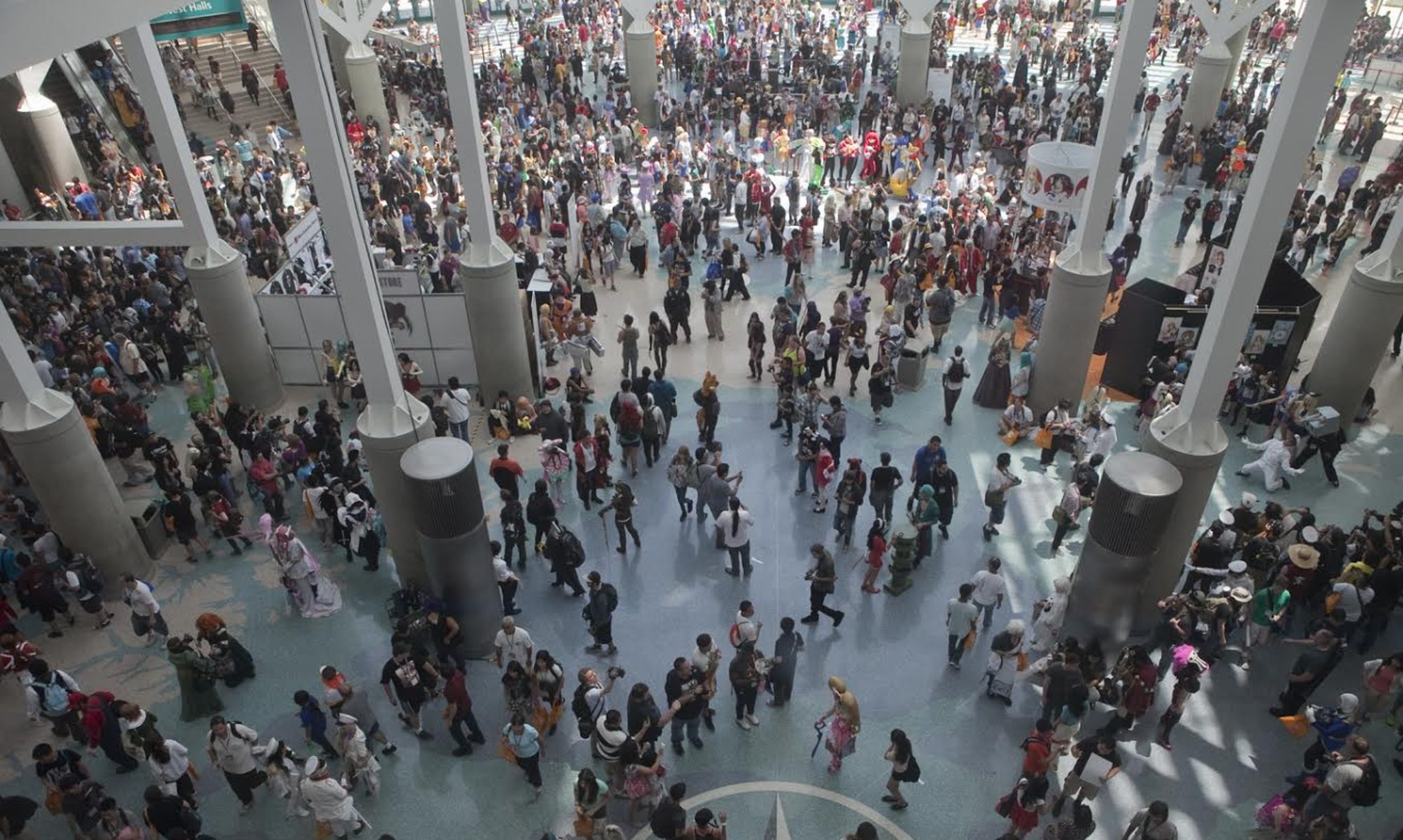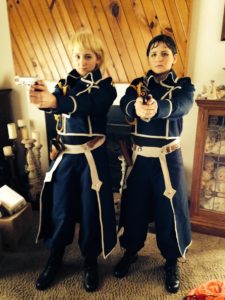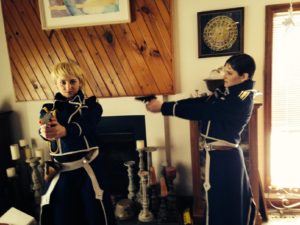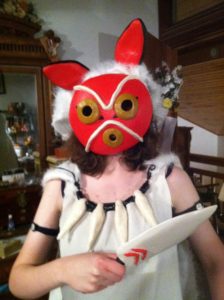Age: 24
Location: New Mexico
When did you discover anime? Share as much as you remember. Honestly, my memories of this are very vague? I fell in love with anime in elementary school (and have been in love ever since), but I’m not sure when the shift between my liking anime that I didn’t realize was different than the cartoons I watched (i.e., Pokemon and Digimon) to my actively understanding my love of anime as me loving something called “anime” occurred. I’m not sure if I knew YuGiOh! was an anime when I started watching it. I probably knew Dragon Ball Z was, and definitely knew it by the time I started watching things like Gundam Wing and Yu Yu Hakusho. By the end of elementary school (which was 5th grade for me), I was a full-blown anime fan, relying on rentals from Hastings to introduce me to new series.
What appealed to you about anime when you first discovered it? Everything? I liked the stories, the animation—everything. Unlike cartoons, anime had an overarching plot, which I loved. It didn’t hurt that I never really liked live-action television, for whatever reason.
What would you say was the most popular anime at the time? Digimon had a universal appeal among other kids, even those who weren’t into anime/didn’t know what it was. For those of us who did, it was Dragon Ball Z, Yu Yu Hakusho, and Gundam Wing. I was vaguely aware of the existence of Sailor Moon, but never saw it myself because I didn’t have the channel it was on, and, as it wasn’t until I was in 6th grade that I even met another female anime fan, it didn’t even occur to me to check if Hastings had such a girly series to watch.
How did knowing other female anime fans change the way you engaged in fandom, as opposed as when you bonded over anime with your brother? Meeting other female anime fans definitely changed how I engaged with fandom. Before, I watched anime with my brothers and his friends, and we spent a lot of time talking about it, but I also continually restricted myself in what I talked about. That is, I talked about the kinds of topics they talked about, and avoided anything that could be construed as “girly”, like when I had a crush on a particular character or was invested in a particular pairing / wished that a different pairing would happen. Sometimes I got around these constraints with a kind of personal code—i.e., saying a particular character was my “favorite” when what I really meant was “this character is super-cute and I totally have a crush.” It was all very much an attempt to just “be one of the boys” and “not like other girls,” but it also wasn’t really a conscious decision—it’s something that I only realized that I was doing when I met other female anime fans and felt free to talk about whatever caught my attention in an anime, whether that was squeeing over a particularly awesome fight scene or sighing over something especially romantic.
And I didn’t just stop with my female friends—having those friendships also left me more comfortable to talk about whatever I wanted with my brother, and, to a lesser extent, his friends. I’m not sure if I can say exactly why this was the case—like I said, much of this was a subconscious reaction from me—but if I had to guess, I’d say it’d because I had a safety net that I hadn’t had before. I no longer had to worry as much about what my brother’s friends thought of me, because I had my own friends who loved anime too. As for my brother, he’d always been my best friend: seeing that other anime fans didn’t have a problem with the more so-called “girly” parts of my interests made me more confident that he wouldn’t have a problem with it either. (And he didn’t—I’m fortunate to have a truly excellent brother.)
Looking back, being an anime fan before I met other female anime fans was characterized by a lot of tension, first in hiding my love of anime from “normal people,” and then from hiding particular aspects of my enjoyment of anime from those who remained. Meeting other female anime fans released that tension and allowed me to relax in a way I couldn’t allow myself to before.
It was also after that I met other female anime fans that I began to be drawn into online fandom, particularly fanfiction, but I’m not sure if I can say that was directly because of meeting them. I do think it accelerated the process (as it was one of those friends stumbling upon fanfiction and then showing it to me that introduced me to the concept), but I’d already been fond of writing for years, and had just begun exploring the Internet myself at home, so it’s not impossible that I would have stumbled upon it eventually. It did become a core part of our friendship, though, and one that was never shared by the male anime fans in my life.
What was it like to be a part of anime fandom at the time? It was COMPLETELY DIFFERENT from how it is now. A big focus was on actually getting access to various series—it was really freaking hard. My brother and I depended on rentals from Hastings and friends who had more channels than us recording bits and pieces of series for us. It was very male-dominated—like I mentioned above, I didn’t meet another female anime fan until I was in the 6th grade; before then, I relied on my brother and his friends to talk about anime with.
Also: loving anime was like, a HUGE SECRET for me. I was open enough about it with my brother and his friends, but with MY friends and classmates? Nope. Never said a word. I only met the other female anime fan in 6th grade because I vaguely described a moment “from a show I saw” in front of a new acquaintance, and SHE (who was ALSO keeping her love of anime a secret) recognized it as a moment from Yu Yu Hakusho—and then, on top of that, that revelation led to me finding out that another girl I’d been friends with since 4th grade was also obsessed with anime and video games and had been keeping it a secret. Like, we’d been good friends for over two years, and these were major hobbies for us, yet neither of us had felt comfortable enough to reveal our “secret” to one another until a series of coincidental events sent our secrets toppling down. There was just such a taboo on being an anime/video game fan, and doubly so if you were a girl—it’s weird to remember that now.
Why did people back then keep anime fandom a secret? Why was it especially important for girls to do so? Again, I don’t think I ever consciously thought about why it had to be such a secret, but I think I can break it down the reasons why I felt that way. There was very much a dislike of the “other,” that is to say, the “nerdy.” This very much only applied to anime and video games. Even what we thought of as the “normal” kids in our school were drawn to card games for a few years during elementary, and other kids actually admired me for reading so much. My brother and his friends were actually bullied to varying extents, though I didn’t know this until years later. At the same time, I was very much aware of how other, “normal” people viewed one particular friend of my brother, who was also happened to be the one who was the most open about loving anime (he wore anime-themed t-shirts, had anime pins on his backpack, etc.) (He was also, I learned later, the one who had been bullied the worst.)
Basically, the culture around me gave me the feeling that liking anime and video games was something to be looked down upon, though it’d never been stated to me in such terms. Furthermore, there was a sense that these were essentially “boy” interests—boy interests that should be mocked, yes, but something for boys all the same. So that compounded the problem for me: it was supposedly embarrassing to like these things, and even if it was going to hypothetically be okay for a boy to like them, I, as a girl, shouldn’t have been interested in them at all. I think I mentioned that I’d been close friends with a certain girl for two years before we found out that we were both closet anime and video game fans (and fairly passionate fans at that). I never asked her why she kept it a secret and she never asked me, and it was because it was something that we never needed to ask: it was something that we both took as a given.
Was the Internet a part of fandom at the time? If yes, how? If no, how did you connect with other fans? For me, the internet didn’t really play a role until I got into middle school. Any connection with fans happened only if you happened to meet someone who liked anime (which sometimes was a complicated thing to figure out, as my story in the above answer might suggest.)
What was online fandom like then? What sites and services did people converge around? Most of my online fandom interactions were in the context of fanfiction and the fanfiction-writing community. The very first site with anime fans on it that I discovered was called Quizilla. I believe that it no longer exists, but it was a website formed around user-created quizzes. Not all were fandom-related, not by a longshot—there were all sorts of quizzes with titles like “What color is your soul?” and “What animal are you?” and so on—but there were also fandom-related quizzes like “Which Yu Yu Hakusho character are you?” and “Which Inuyasha character would be your boyfriend?”
It was through this website that my friends and I discovered fanfiction. Quizilla definitely wasn’t created to host stories, but people posted them anyways. This is a bit difficult to explain, but I’ll try. Each chapter of a story was posted as its own “quiz” (and before Quizilla implemented a folder structure where you could group quizzes of a similar type, it was sometimes difficult to find each chapter in the right order on the writer’s page). People handled this in different ways: some posted the entire chapter text in the first question box, others split it up among questions boxes with the “answers” being used to track people’s reactions (i.e., “I like it so far, keep going!” could be the first answer option, while the second would be something like “Ugh, this sucks!”). The only way to track how many people read a story is if they went to the quiz results page, so some authors would post the last section of the chapter in the results in an effort to get people to click through, while others would try to tempt them with the promise of pretty/cute/sexy fanart (which they’d usually found through Google—crediting the original artists definitely wasn’t a big concern back then). Later, Quizilla did implement a story posting feature, and reactions among the writers were mixed: most of my friends (online and offline) and I were decidedly against it, though I no longer remember why.
Pretty much all the stories on Quizilla were self-inserts, and I believe that it was mostly younger fans in their teens who converged there. Most discussion took place through private messages, which were usually started when someone liked someone else’s story. Some people did put what were basically chat room widgets in the results pages of their stories, but most of what was posted there was feedback on the story itself, though sometimes actual discussion did occur. I think that Quizilla did implement message boards or community posts later on, but I never spent much time on them.
A couple of years later, I discovered fanfiction.net, and through it Livejournal. I still spent time on Quizilla, but I definitely began to fade out of it as my main online home in favor of Livejournal. I joined LJ when I was about 13, and I do think there was an older demographic there than there was on Quizilla: while there were plenty of people around my age and older, I don’t really recall anyone who was younger than me—at least, not who would admit to it—and there were plenty of people college aged and older. There was much more in-depth discussion there than on Quizilla, but also more discussion about our personal lives. I made friends on Quizilla, but I made many more on LJ, and the environment on there was definitely more conducive to that. At the same time, there was a stronger emphasis on pseudonyms than there is now. Only my closest friends learned my real name, for instance.
I also briefly spent some time in a general chatroom on an anime website. I’m not sure which one it was anymore. Both male and female anime fans talked there, most of them in their teens or early twenties, and fanfiction didn’t play a role in the discussions at all. There were also roleplaying communities on LJ and Proboards, but I didn’t really spend much time there, so I can’t say much about it.
Do you remember your first convention? What was it, and what was it like?
I’ve… actually never gone to a convention. I remember that I was D Y I N G to for most of middle school and high school, but all the conventions at the time were just too far away, and too much money for me to justify it with.
Have you been to any in-person fandom events, like a club? I was technically a member of my high school’s anime club for about two years, but it was a disappointing experience all around. It mostly comprised of everyone disagreeing about what anime to watch, and then watching nothing in the end. There was also a bit of an unwelcoming attitude there. For instance, my best friend at the time had a well-known love of Pikachu, and when we were tossing around ideas for a potential t-shirt for the club, many of the members thought it would be “hilarious” if some drew a picture of Goku killing Pikachu to use on the t-shirt. Yeah.
For many years I also attended a regular meet-up of card players at a local restaurant every Saturday, and while the focus was mostly on card games (all kinds, but the main one was initially Yu-Gi-Oh, and then Magic: The Gathering later on), many of them were fans of actual anime as well. Some of the memberships between these groups did overlap (though there were many more card-players than anime club members), and both very much had a boy’s club kind of atmosphere (my best friend at the time was the only other girl who attended the card-playing meet-ups), though I liked the card-player meet-ups better.
You said anime fandom, “was very male-dominated.” Is it different today? Why or why not? This is a bit of tricky question for me to answer, because the context in which I interact with anime fandom is so very different. Anime fandom was very male-dominated for me in my early years as a fan because I was almost entirely limited to interacting with anime fans in real life, and the majority of them (at least, the majority who would admit to be anime fans) were male. Even when I started interacting more with (mostly female) fans on the internet, I continued to know mostly male anime fans in real life. These days, I interact almost solely with female anime fans, but nearly all of those interactions occur online.
That being said, I do think it’s easier for me personally to be open about being an anime fan than it was when I was younger. If I worry about someone judging me for being an anime fan in real life, it’s because I’m worried that they’ll judge me for being someone who likes anime, period, not because they’ll judge for specifically being a girl who likes anime. In that sense, I do think the boundaries have broadened.


 To this day I have watched 274 different TV anime and am an avid cosplayer. I have gotten many other people into the medium and am even learning Japanese with great enthusiasm. Most strikingly, it has helped me deal with the treatment-resistant depression that has been slowly taking all positive feelings away from me over the years. Stories like NGE,
To this day I have watched 274 different TV anime and am an avid cosplayer. I have gotten many other people into the medium and am even learning Japanese with great enthusiasm. Most strikingly, it has helped me deal with the treatment-resistant depression that has been slowly taking all positive feelings away from me over the years. Stories like NGE, 